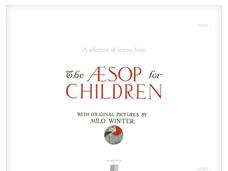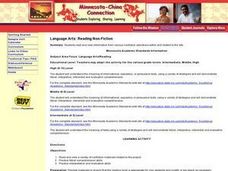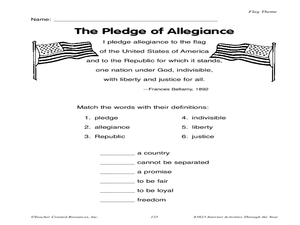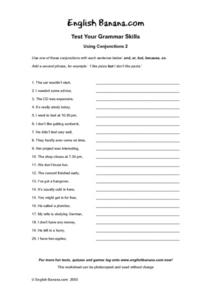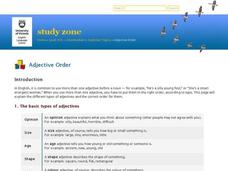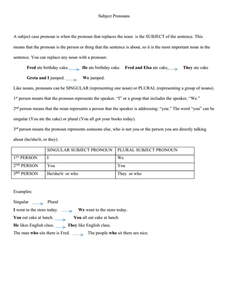Curated OER
Lesson: Animal Journeys
Here is a great way to get the brain going. Children look at an image of the sculpture, Jar and then imagine what an animal would look like as it moved inside the sculpture. They then use clay and cookie cutters to create a...
Curated OER
Story Telling through Photography
Use this writing and photography lesson plan in your descriptive writing unit. Elementary and middle schoolers write and create a story line incorporating photos from Inspiration or their own personal photos. They experiment with...
Library of Congress
A Selection of Stories from The Æsop for Children
Read and incorporate a variety of Aesop's Fables into a fable genre study with an eBook produced by the Library of Congress. The interactive eBook contains 146 fables written by Aesop and includes colorful interactive illustrations by...
Curated OER
Language Arts: Reading Non-Fiction
Students read and view information sent from seven high school students who travel to China. The daily reports that they send back to the weblog section of the site should be of high interest to students in Minnesota.
Curated OER
Language Arts- Parts of Speech: Sorting Nouns and Verbs
In this grammar activity, students cut out the word cards and glue them under the noun heading if they are nouns, and the verb heading if they are verbs. There are 20 words to sort through.
Curated OER
Flag Language Arts
Students write a description of a flag. In this writing lesson, students pick a flag and write a description of it. Students should include colors and symbols present on the flag. Students share their descriptions and the class must...
Curated OER
Really Motivational Page of Encouraging Thoughts
In this language arts worksheet, students discover motivational idioms by matching the first half of each saying with the second half. Students then discuss the meaning of each. Example: "You can't make an omelette without.....breaking...
Curated OER
Using Conjunctions 2
In this language arts worksheet, students learn that conjunctions can tie two parts of a sentence together. Students read the first half of a sentence and add a second phrase, choosing a conjunction from the list: and, or, but, because...
University of Victoria
Introduction to Adjective Order
Here is an online teaching tool that you can use to help fourth graders understand the proper ordering of adjectives. An explanation is given for eight different types of adjectives in addition to guidelines about how to order them. This...
Curated OER
Conventions-Interjections
Fifth graders discuss interjections reviewing them to be words or phrases that express excitement or strong emotion. In this language arts activity, 5th graders understand that commas or exclamation marks are used to separate...
Curated OER
Common Idioms-- Body Parts 2
In this language arts worksheet, students read 20 names of body parts in a word bank. Students fill in the missing words in common idioms. Example: Riding the roller coaster was quite a ------- raising experience! (hair)
Curated OER
Test Your Vocabulary Skills: More Common Idioms 2
In this language arts worksheet, students discover that idioms are spoken or written sentences where the meaning is not obvious from the individual words used. Students read 10 idioms and match them to their meanings.
Curated OER
Made Up Words: Parts of Speech
In this language arts worksheet, students find and underline 21 made-up words in the 10 sentences shown. Students identify what part of speech that word is and place each in the parts of speech chart. Finally students write the sentences...
Curated OER
The Power of Words in "Charlotte's Web"
Students analyze the text in Charlotte's Web. In this language arts lesson, students dissect the passages from Charlotte's Web, specifically the adjectives Charlotte used to describe Wilbur. Finally, students play a game using "word...
Curated OER
What Qualities Does a Hero Have?
Study the characteristics of real-life heroes in your history or language arts lesson. After reading about the soldiers of World War I, kids write autobiographies from their future elderly selves, and reflect on their acts of heroism yet...
Curated OER
Troubling Tenses-- Past Simple Vs. Present Continuous 2
In this language arts worksheet, students learn to differentiate between "yesterday" and "tomorrow" by filling in the blanks in 15 sentences with the correct word.
Curated OER
Troubling Tenses--Past Simple vs. Present Continuous 1
In this language arts worksheet, students explore the past simple and present continuous verb tenses by completing 15 sentences with the word "tomorrow" or "yesterday."
Curated OER
A Lucky Break
Explore idioms with a chicken theme! Consider doing these activities prior to Thanksgiving, as there's a section about wishbones! First your youngsters will match a short list of idioms with their meanings. Then, give each learner the...
Curated OER
Reliving History through Slave Narratives
Helpful for an American literature or history unit, this lesson prompts middle schoolers to examine slavery in the United States. They read slave narratives that were part of the Federal Writers' Project and then conduct their own...
Curated OER
Four Corners Debate
Should the student population wear uniforms to school? Pupils express whether they strongly agree, agree, disagree, or strongly disagree with a controversial statement, moving to a designated corner of the room to indicate their stance....
Curated OER
Snowy Similes
The class defines similes after creating a KWL chart about them. Groups rotate through a series of stations in which they creatively complete similes. They create a picture booklet that contains similes. However, the booklet topic and...
Building Background Knowledge: Learning About the Historical and Geographical Setting of Esperanza Rising
Set up your class to read Esperanza Rising, by Pam Munoz Ryan, through a class read-aloud and exploration of the setting. The detailed lesson plan outlines each step. First, class members read over the first few pages and focus on the...
Curated OER
Bringing Household Items to Life
Use folk tales as inspiration for learning about and using personification in creative writing. Learners brainstorm together in order to practice personification before writing their own poems or paragraphs about a household object.
Savvas Learning
Pronouns
As part of their English grammar study, language learners engage in the games, exercises, and activities found in a 13-page packet that focuses on pronouns.
Other popular searches
- English Language Arts
- English Language Arts Exam
- English Language Arts Games
- Deaf English Language Arts
- English Language Arts Music
- English Language Arts Heroes
- English Language Arts Skills
- English Language Arts Grade 3
- English/language Arts
- English Language Arts Poetry
- English Language Arts Rating=3
- English Language Arts Unit Sc




